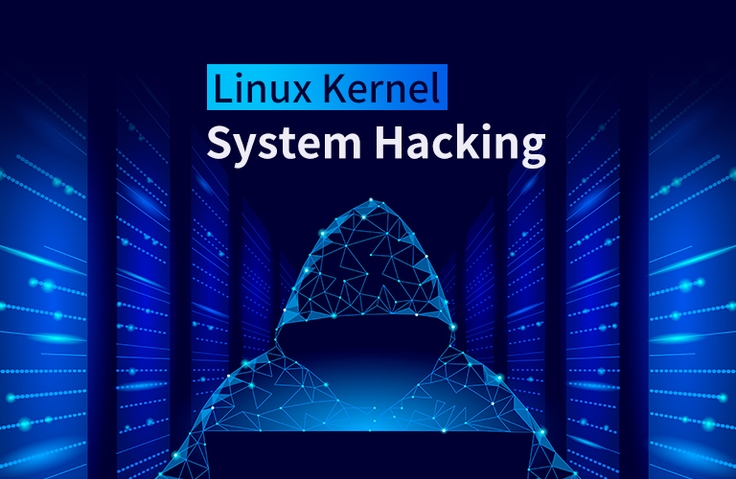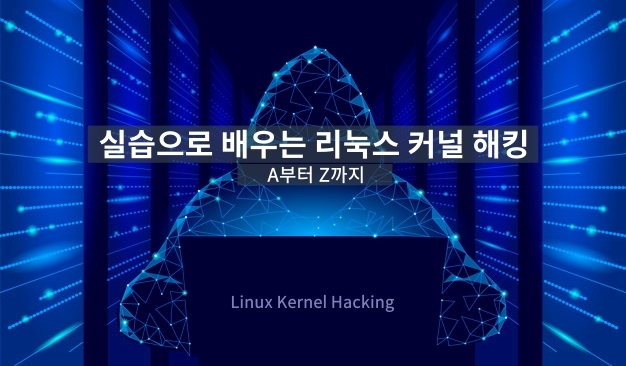
Web Hacking from Beginner to Intermediate, Learn All at Once
knockOn
Web Hacking, Okay For Beginners. Web Security Intro: Basics to Practical Feel, Learn Like a Hacker.
초급
Penetration Testing
This lecture analyzes various protection techniques in the Linux kernel, methods to bypass them, and various vulnerabilities. Practical examples are provided for each lecture.
634 learners
Level Intermediate
Course period Unlimited

Linux Kernel Hacking
CTF Kernel Problem Solving
Linux Kernel Exploit

This course is designed to provide general knowledge about Linux kernel hacking.
Linux kernel hacking is a field that has very little study material in Korea, and there are numerous difficulties starting from the environment configuration stage. However, if you take this course, you can easily study not only environment configuration , but also various protection techniques bypass methods and various vulnerabilities .
Also, unlike other information security lectures that simply teach how to use specific tools or reintroduce already well-known hacking techniques, this lecture is characterized by introducing various exploit techniques based on the low-level operating principles.

▲ Privilege escalation caused by exploiting a vulnerability in the Linux kernel
In recent years, Linux kernel problems have been consistently included in major CTFs. Recently, the frequency of appearances has been increasing. If you "completely" understand this lecture, you will be able to solve most of the Linux kernel problems presented in CTFs, and I would like to tell you that it will be of great help in finding vulnerabilities in the real world.
Lastly, the most notable feature of this course is that the instructor provides practice example files for each lecture. Through these practice example files, students can follow the lectures and debug them themselves.

▲ Section 4.6. Userfaultfd Utilization Technique Lecture Materials
This lecture consists mostly of presentations using Keynote, as in the examples above.
Before we begin the lecture in earnest, this section provides a brief introduction to the instructor and explains the lecture plan.
This section covers the basic background knowledge needed to hack the Linux kernel.
This section will show you how to set up an environment for debugging the Linux kernel. In the process of setting up an environment for the real world, you will build the Linux kernel and file system yourself, and in the process of setting up an environment for CTF, you will learn about the preparation process for solving a problem.
This section will learn about the various protection techniques of the Linux kernel and practice techniques to bypass each protection technique. The protection techniques to be studied are those of Intel series architectures, and a total of 6 protection techniques will be studied. In addition, from this section onwards, practice example files will be provided for each lecture.
This section explores various techniques that can be used to escalate privileges when a Linux kernel vulnerability is exploited.
This section covers the different types of vulnerabilities that can occur in the Linux kernel.
This is a section where we solve Linux kernel problems that were actually presented in CTF. The problem to be solved is the Input Test Driver problem presented in the 2020 Defenit CTF , a competition run by the instructor's team.
This section concludes the lecture by introducing references that will be helpful when studying the Linux kernel.
1. C language
1. Knowledge related to system hacking (BOF, ROP, UAF, etc.)
2. Assembly language (x86_64)
Q. I have never hacked a system before and I don't know assembly language. Can I still take the course?
A. When producing each lecture, we make it so that even those who are not experts in system hacking can listen to it, so whenever a new term appears, an explanation for it is included in the lecture.
However, since this is a summarized explanation, you should study it in parallel with searching Google when you encounter concepts you don't know, and keep in mind that if you take the course without any knowledge of system hacking, the learning period will be much longer.
Q. What version of Linux do you use?
A. In my case, I used Ubuntu 18.04 version. (https://releases.ubuntu.com/18.04/)
Q. The lectures are serialized, so when will the remaining lectures be uploaded?
A. All lectures have now been uploaded.
Who is this course right for?
For those who want to study Linux kernel hacking for the first time
If you have studied pwn2own and now want to get started with Linux kernel exploits
Need to know before starting?
C language
634
Learners
29
Reviews
63
Answers
4.9
Rating
1
Course
리눅스 커널 해커 및 컨트리뷰터로 활동 중인 김현우(V4bel)입니다.
⦁ Contact: imv4bel@gmail.com
Work Experience
⦁ Theori (2022.11 ~ 2025.07)
Awards
⦁ Pwnie Awards 2025 Best Privilege Escalation category Winner (CVE-2024-50264)
⦁ Pwn2Own Berlin 2025 Red Hat Linux in the LPE category Winner (Theori, $15,000)
⦁ Google kernelCTF LTS-6.6.75/COS-105 1-day Winner (CVE-2025-21756, $71,337)
⦁ Google kernelCTF LTS-6.6.56/COS-109 0-day Winner (CVE-2024-50264, $81,337)
⦁ Google kernelCTF LTS-6.6.35 0-day Winner (CVE-2024-41010, $51,337)
Vulnerability Reports
⦁ CVE-2025-38087 (Linux Kernel Traffic Control TAPRIO Use-After-Free)
⦁ CVE-2024-50264 (Linux Kernel Virtual Socket Use-After-Free)
⦁ CVE-2024-27394 (Linux Kernel TCP Use-After-Free)
⦁ CVE-2024-27395 (Linux Kernel OpenvSwitch Use-After-Free)
⦁ CVE-2024-27396 (Linux Kernel GTP Use-After-Free)
⦁ CVE-2023-51779 (Linux Kernel Bluetooth Socket Use-After-Free)
⦁ CVE-2023-51780 (Linux Kernel ATM Socket Use-After-Free)
⦁ CVE-2023-51781 (Linux Kernel Appletalk Socket Use-After-Free)
⦁ CVE-2023-51782 (Linux Kernel Rose Socket Use-After-Free)
⦁ CVE-2023-32269 (Linux Kernel NET/ROM Socket Use-After-Free)
⦁ CVE-2022-41218 (Linux Kernel DVB Core Use-After-Free)
⦁ CVE-2022-45884 (Linux Kernel DVB Core Use-After-Free)
⦁ CVE-2022-45885 (Linux Kernel DVB Core Use-After-Free)
⦁ CVE-2022-45886 (Linux Kernel DVB Core Use-After-Free)
⦁ CVE-2022-45919 (Linux Kernel DVB Core Use-After-Free)
⦁ CVE-2022-40307 (Linux Kernel Device Driver Use-After-Free)
⦁ CVE-2022-41848 (Linux Kernel Device Driver Use-After-Free)
⦁ CVE-2022-41849 (Linux Kernel Device Driver Use-After-Free)
⦁ CVE-2022-41850 (Linux Kernel Device Driver Use-After-Free)
⦁ CVE-2022-44032 (Linux Kernel Device Driver Use-After-Free)
⦁ CVE-2022-44033 (Linux Kernel Device Driver Use-After-Free)
⦁ CVE-2022-44034 (Linux Kernel Device Driver Use-After-Free)
⦁ CVE-2022-45888 (Linux Kernel Device Driver Use-After-Free)
Linux Kernel Contributions
⦁ net/sched: fix use-after-free in taprio_dev_notifier
⦁ vsock: prevent null-ptr-deref in vsock_*[has_data|has_space]
⦁ vsock/virtio: cancel close work in the destructor
⦁ vsock/virtio: discard packets if the transport changes
⦁ vsock/virtio: Initialization of the dangling pointer occurring in vsk->trans
⦁ hv_sock: Initializing vsk->trans to NULL to prevent a dangling pointer
⦁ tcp: Fix Use-After-Free in tcp_ao_connect_init
⦁ net: openvswitch: Fix Use-After-Free in ovs_ct_exit
⦁ net: gtp: Fix Use-After-Free in gtp_dellink
⦁ Bluetooth: af_bluetooth: Fix Use-After-Free in bt_sock_recvmsg
⦁ atm: Fix Use-After-Free in do_vcc_ioctl
⦁ appletalk: Fix Use-After-Free in atalk_ioctl
⦁ net/rose: Fix Use-After-Free in rose_ioctl
⦁ media: dvb-core: Fix use-after-free due to race at dvb_register_device()
⦁ af_key: Fix heap information leak
⦁ netrom: Fix use-after-free caused by accept on already connected socket
⦁ net/rose: Fix to not accept on connected socket
⦁ net/x25: Fix to not accept on connected socket
⦁ efi: capsule-loader: Fix use-after-free in efi_capsule_write
⦁ HID: roccat: Fix Use-After-Free in roccat_read
⦁ video: fbdev: smscufx: Fix use-after-free in ufx_ops_open()
⦁ video: fbdev: smscufx: Fix several use-after-free bugs
⦁ char: xillybus: Fix trivial bug with mutex
⦁ bpf: Always use maximal size for copy_array()
⦁ media: dvb-core: Fix UAF due to refcount races at releasing
All
33 lectures ∙ (5hr 31min)
Course Materials:
All
29 reviews
4.9
29 reviews
Reviews 5
∙
Average Rating 5.0
5
It was good for beginners because it explained kernel hacking lectures that are hard to find in Korea in an easy way.
thank you :)
Reviews 1
∙
Average Rating 5.0
5
Even beginners can easily understand the explanations, and the answers to questions are very quick and friendly!! I personally learned a lot.
Thank you 🙂🙂
Reviews 1
∙
Average Rating 5.0
5
This was a very useful lecture for those who are new to Linux kernel hacking. The core content was explained in an easy-to-understand manner, and the learning examples using QEMU made it even easier to understand. https://defenit.kr/2019/12/03/Pwn/%E3%84%B4%20Research/linux-kenel-bpf/ I think it would be more effective to study in conjunction with the link above, which is Team Defenit's kernel LPE vulnerability analysis data. I am learning a lot in many ways. Thank you.
Thank you for the detailed review :)
Reviews 1
∙
Average Rating 5.0
Limited time deal ends in 4 days
$14,495.00
29%
$127.60
Explore other courses in the same field!